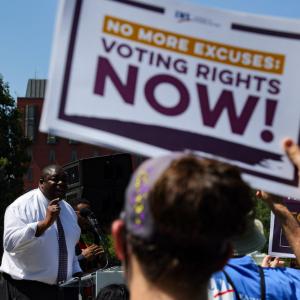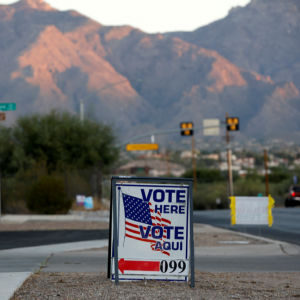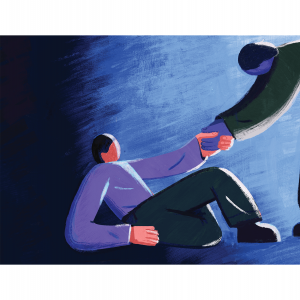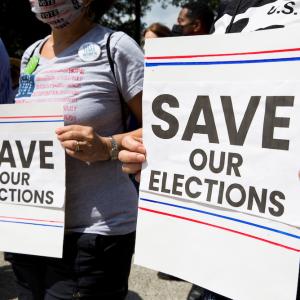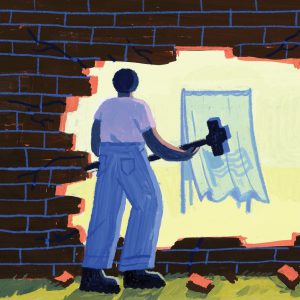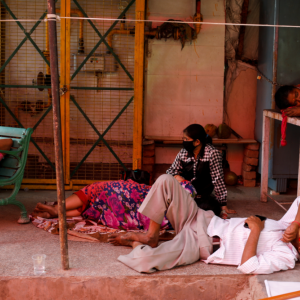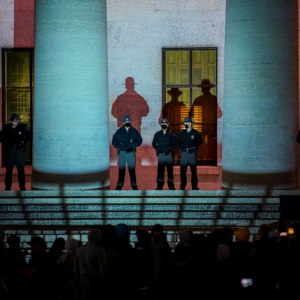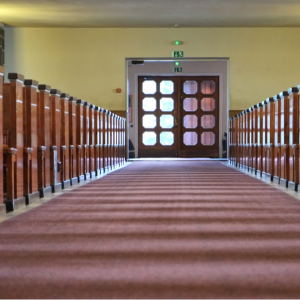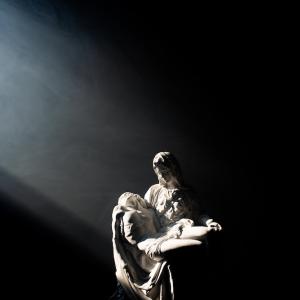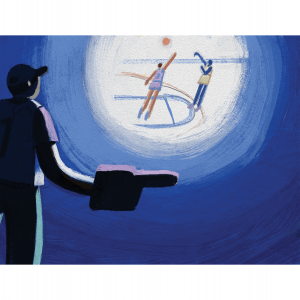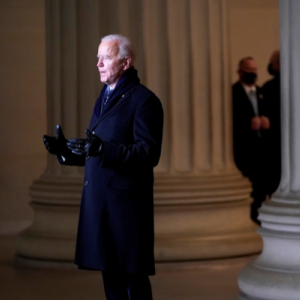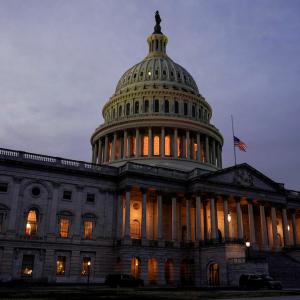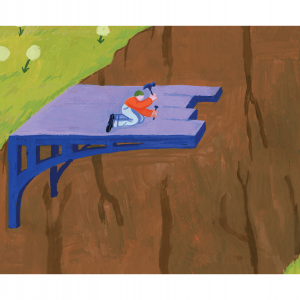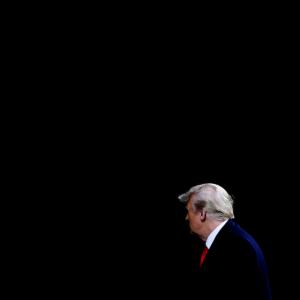
Rev. Adam Russell Taylor is president of Sojourners and author of A More Perfect Union: A New Vision for Building the Beloved Community. Follow him on Bluesky @revadamtaylor.
Taylor previously led the Faith Initiative at the World Bank Group and served as the vice president in charge of Advocacy at World Vision U.S. and the senior political director at Sojourners. He has also served as the executive director of Global Justice, an organization that educates and mobilizes students around global human rights and economic justice. He was selected for the 2009/2010 class of White House Fellows and served in the White House Office of Cabinet Affairs and Public Engagement. Taylor is a graduate of Emory University, the Harvard University Kennedy School of Government, and the Samuel DeWitt Proctor School of Theology. Taylor also serves on the Independent Sector Board, the Global Advisory Board of Tearfund UK, and is a member of the inaugural class of the Aspen Institute Civil Society Fellowship. Taylor is ordained in the American Baptist Church and the Progressive National Baptist Convention and serves in ministry at the Alfred Street Baptist Church in Alexandria, Va.
Speaking Topics
- Human rights and global poverty
- Racial justice
- Voting rights
- Climate justice
- Economic justice
- Immigration
- Peace and nonviolence
- His most recent book, A More Perfect Union: A New Vision for Building the Beloved Community
Speaking Format
- Virtual and in-person events, also available for preaching
Languages
- Fluent in English
Past Notable Events
- Tufts University’s Russell Lecture
- United Church of Christ General Synod Gathering Keynote
- Children’s Defense Fund Staff Retreat Keynote
- Parliament of the World Religions
- Christian Community Development Association Keynote Panel
Posts By This Author
Is a ‘Redemptive Patriotism’ Possible?
People in the United States have deeply conflicting understandings of our nation’s history: Are we a nation that guarantees “liberty and justice for all”? Or are we a nation that will continue to confine this promise to only certain Americans, falling short of realizing this promise for all? When we explore these questions, we start to see that many injustices that show up today have been with us since the nation’s founding.
How Voting Rights Became a Privilege For Some, Not a Right for All
Is voting a right or a privilege? On Tuesday, as the House passed the John Lewis Voting Rights Advancement Act, I was filled with hope for our democracy. But overshadowing that hope was moral indignation, as I realized that not a single Republican member voted in favor of the act — further proof that voting rights has metastasized into a hyper-partisan issue in 2021, despite its long history of bipartisan support.
The Antidote to Individualism
A southern-African philosophy points the way to a thriving society.
In a real sense all life is interrelated. All [people] are caught in an inescapable network of mutuality, tied in a single garment of destiny. Whatever affects one directly, affects all indirectly. I can never be what I ought to be until you are what you ought to be, and you can never be what you ought to be until I am what I ought to be. ... This is the interrelated structure of reality. —Martin Luther King Jr.
WHEN I STUDIED abroad in South Africa in 1996, I learned much about the power of interdependence and mutuality. There I encountered and experienced the southern-African philosophy of ubuntu. Through Nelson Mandela’s moral leadership and embodiment of ubuntu, the nation was led through transformational change. Like Dr. King, Mandela refused to hate his enemies, including those who kept him imprisoned for 27 years, as he envisioned a future South Africa that included Black and white together.
Archbishop Desmond Tutu summarized ubuntu in what became a marker of both a movement and a philosophy: “I am because we are.” Mpyana Fulgence Nyengele, author of Cultivating Ubuntu, offers this definition: “Ubuntu is the substance and core being of a person and speaks particularly about the fact that we cannot be fully formed as human beings in isolation.” Rather, as Stephen Lewis, Matthew Wesley Williams, and Dori Baker share in Another Way, Nyengele explains that “it is only through our communal participation and interaction with other people that we begin to develop trust, compassion, caring, humility, kindness, and forgiveness, which are all qualities of what it means to be human and humane toward others. Similar to the fruit of the spirit, ubuntu is possible because ntu or Spirit ‘orients persons toward life-giving choices, actions and behaviors.’ ... Therefore, ‘ubuntu promotes and enhances the abundance of human life in community and beyond.’”
I think of ubuntu as an expanded, vivid version of the Golden Rule: We are called to do unto others as we would have them do unto us. Or, as King so often put it, we are to be “our brothers’ and sisters’ keeper.”
Our Democracy Is Not a Given
As many people in the United States prepared for the holiday weekend, the Supreme Court’s conservative 6-3 majority upheld two laws that restrict voting in Arizona. The first law the court upheld disenfranchises voters if they cast a ballot in the wrong precinct, invalidating not just their votes for local races, but also their entire ballot, including votes cast in U.S. presidential elections or Senate races, even though all eligible voters in Arizona can vote in those races regardless of the district where they live. The other law prohibits most people from delivering another voter’s absentee ballot to a polling place, making it a crime for anyone but a family member or caregiver to do so.
How Has the Pandemic Changed You?
Breaking the stigma around mental health.
HOW HAS THE pandemic changed you? This question can feel loaded, as though our answers should contain revelatory insights or transformational changes in our mindsets or lifestyles. My answers have varied. Since the pandemic forced my intense travel schedule to come to a screeching halt, I’ve realized just how unsustainable that schedule, with its impact on my family life, had become. I look forward to returning to traveling soon, but I am determined to be much more selective about it. I also often reflect on the ways that my family deepened our love for nature during the pandemic, breathing in the beauty of God’s creation. These are just a few of my answers.
But for some of us, the question elicits anxiety about going back to the broken “normal” of pre-pandemic times. For many, lurking behind the question is a recognition that some of the ways COVID-19 has changed us may not be for the better, and some of our struggles during this time may not simply go away because we are vaccinated and can now resume social activities. Sadly, the pandemic amplified a preexisting mental health crisis in this nation. A New York Times article by organizational psychologist Adam Grant popularized a new term: “languishing,” which describes the state of feeling aimless, joyless, and unfocused. This captures a wide continuum between flourishing and full-scale depression. Languishing can also have a deep spiritual dimension: We feel a sense of spiritual fatigue and emptiness or even feelings of abandonment and anger toward God. They can be compounded by the inability during the pandemic for most of us to experience in-person fellowship and worship.
The Moral Case for Suspending the Filibuster
The filibuster, a rule that has typically been used by minority parties to delay or block legislation, often by making long speeches, can easily seem like an arcane and distant issue. While there is a compelling case to end the filibuster, that will be difficult to near impossible any time soon. But the Senate could act with urgency to suspend the filibuster for bills that directly address voting rights and democracy reform; doing so may be the last hope in the short term to strengthen our democracy and prevent future elections from being stolen.
For Lasting Peace, U.S. Must Stop Enabling Israeli Occupation of Palestine
The images of civilian deaths and escalating violence in Israel and Palestine are heartbreaking. As this moral, political, and humanitarian catastrophe continues, we must urge our elected leaders to call for an immediate cessation of the current wave of violence, while also building the political will to interrogate the root causes of the crisis.
Building on the Big Lie
The ongoing work for voting rights.
THE NATION'S COMMITMENT to “one person, one vote” is under assault. In the months after the horrific Jan. 6 violent insurrection at the U.S. Capitol, we have seen the greatest effort to restrict the right to vote since the Jim Crow era. A sobering report by the Brennan Center for Justice tracks the surge of legislation proposed by Republicans in statehouses across the country that would further restrict access to voting, all supposedly in the name of election integrity. As of April, Republicans in 47 states had proposed, introduced, or carried more than 360 bills that would further restrict the right to vote by limiting early and mail voting, imposing further ID requirements, enabling voter purges, and other tactics. The good news is that there has also been a push to expand voting rights, with 47 states having introduced 843 bills to expand voting access. The challenge is that in 24 states in which Republicans have a majority in state houses and hold the governorship, many of the voter suppression bills will be difficult to overturn without a surge of public awareness and outrage.
Voter suppression has been a fixture in our democracy since the founders limited the right to vote to land-owning white men. The passage of the 1965 Voting Rights Act extended the right to vote to everyone, including Black citizens who were disenfranchised through violence and Jim Crow laws. Now, more than 55 years later, we are witnessing a resurgence of voter repression efforts.
Protect People, Not Patents
It is painful to know that here in the U.S., some states have vaccines that are going unused when vaccine shortages exist around the world.
U.S. Policing Is Broken. Christians Must Reimagine Public Safety
Chauvin’s conviction was a relief, but our policing and justice systems still need a radical overhaul.
It’s Time To Rethink American Churches
I believe the church is a critical and indispensable — though not exclusive — vehicle for sharing the good news and advancing God’s beloved community here on Earth. But last week, Gallup caused a stir when it released new research on the trends in Americans’ membership in houses of worship, which fell below 50 percent for the first time in the 80 years.
God Suffers With Us This Holy Week
Today begins the Paschal Triduum, the three days leading up to the celebration of Easter and Jesus’ triumphant resurrection. This year in particular, Holy Week is a reminder that we often have to linger in some suffering and struggle in order to fully appreciate the joy of Easter Sunday’s deliverance and liberation.
March Madness and the Israelites in the Desert
Both offer lessons as we emerge from the pandemic.
MARCH IS MY favorite month of the year and not simply because of the renewal of spring. As a college basketball fanatic, it is also because of the NCAA men’s tournament, otherwise known as March Madness. My passion for college hoops began when I moved to Tucson before my junior year of high school and started attending every home game at the University of Arizona, where college basketball is an obsession. In light of the hardship and devastation that this pandemic has inflicted, it feels overdramatic to say that my spirits were crushed last March when the NCAA made the necessary decision to pull the plug on the March Madness tournament. This year, the NCAA plans to host the tournament in a bubble, following the model of last summer’s NBA playoffs. The tournament will feel incomplete without screaming fans, but the fact that it will take place at all offers a signal that the beginning of the end of the pandemic is within sight.
As our nation moves out of a long, dark winter of COVID-19 infections, hospitalizations, and deaths, we can all use a dose of something to look forward to, even if those somethings don’t look identical to life before the pandemic. A bubbled March Madness feels like a fitting metaphor to the critically important space we will be in as vaccines help us turn the tide against this virus and toward a new normal. But the journey between the spring and fall will likely feel like a long and tortuous one, particularly if COVID-19 fatigue devolves into resentment, resignation, or at worst nihilism. With the advent of more contagious and possibly more deadly strains of the virus, social distancing and mask-wearing will be even more necessary to transition from the wilderness of the current pandemic into the promised land of a post-COVID-19 world.
The Church Must Model Lament for Our Grieving Nation
This week the United States surpassed a tragic milestone: Half a million people in this country have died from COVID-19 — a number that, while devastating, doesn’t even take into account the full human toll of the virus. While numbers of cases, deaths, and hospitalizations have begun to fall precipitously (for a variety of overlapping reasons) and nearly 50 million Americans have received at least one dose of the vaccine, this dark winter feels like a prolonged wilderness of grief and loss.
This Year Is Dark, But We Still Need Lent
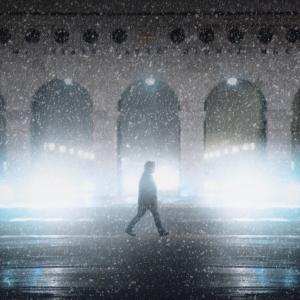
Photo by Alex Ranier on Unsplash.
I’m latecomer to Lent. It wasn’t until I joined Sojourners in my first role as senior political director in 2004 that I learned from my Catholic colleagues the significance of this 40-day liturgical season in which we spiritually travel with Jesus through his fasting in the desert. In 2021, this time of reflection — so often marked by what we give up — comes amid what already feels like a dark, cold, and perilous winter.
When Christian Media Peddle Lies
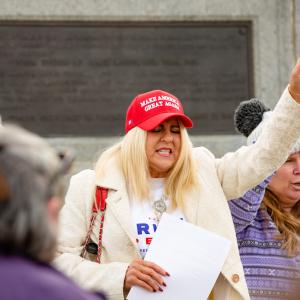
Woman wearing red Make America Great Again hat praying at “Stop the Steal” rally in support of Donald Trump, Nov. 7, 2020. Photo by Brandi Lyon Photography.
This all could have been avoided: More prominent conservative Christian leaders and Christian media could have spoken out against the lie and reported the truth. Instead, many of them fanned the flames that led to this tragedy.
It’s Time to Be the Conscience of American Politics
I believe fervently in the words of Rev. Dr. Martin Luther King Jr., who said that “the church is not called to be the master or servant of the state, but to be the conscience of the state.” In that vein, we will be neither chaplain nor sycophant to our new political leaders. Instead, we seek to be a faithful conscience, serving as a bridge-builder and offering prophetic critique (and pressure) when necessary.
Accountability Is a Prerequisite for Healing
I have been filled with a divine rage since armed insurrectionists, instigated by the president, violently sieged our Capitol last week. There must be accountability. In one move toward that, 10 Republicans joined all 222 House Democrats in voting that President Donald Trump incited an insurrection. He is now the only U.S. president to be impeached twice. Rep. Liz Cheney (R-Wyo.) and the nine other Republicans who joined her described their vote to impeach as a vote of “conscience.” Invoking that word made me thing of Martin Luther King Jr.’s wisdom—
Bridging the Political Gap In A Divided Nation
How we get from polarization to the common good.
IN HIS FIRST speech as president-elect, Joe Biden outlined four priorities his incoming administration plans to address: systemic racism, the COVID-19 crisis, climate change, and economic hardship and recovery. I am encouraged not just by the breadth of policy detail and ambition in his Build Back Better platform but also by the radically different narrative for the nation and its future. These four pillars should resonate for people across the diversity of the church, and they will require that we generate significant political will, urgency, and accountability within the new administration and Congress to achieve progress on these priorities and more. Along with policy reforms, we also face an imperative to renew our broken and toxic political culture.
In the gospel of Matthew, Jesus proclaims, “Every kingdom divided against itself is brought to desolation, and every city or house divided against itself will not stand” (Matthew 12:25). This profound truth is relevant for the church and for the nation.
The President Must Be Removed
As faith leaders, we must call for the immediate removal of Donald Trump from office. There is great danger in the hands of a morally deranged president: the threat of martial law, his ongoing efforts to overturn a free and fair election, the potential of politically conceived war, and the unique danger of his destructive hands on the nuclear codes.

